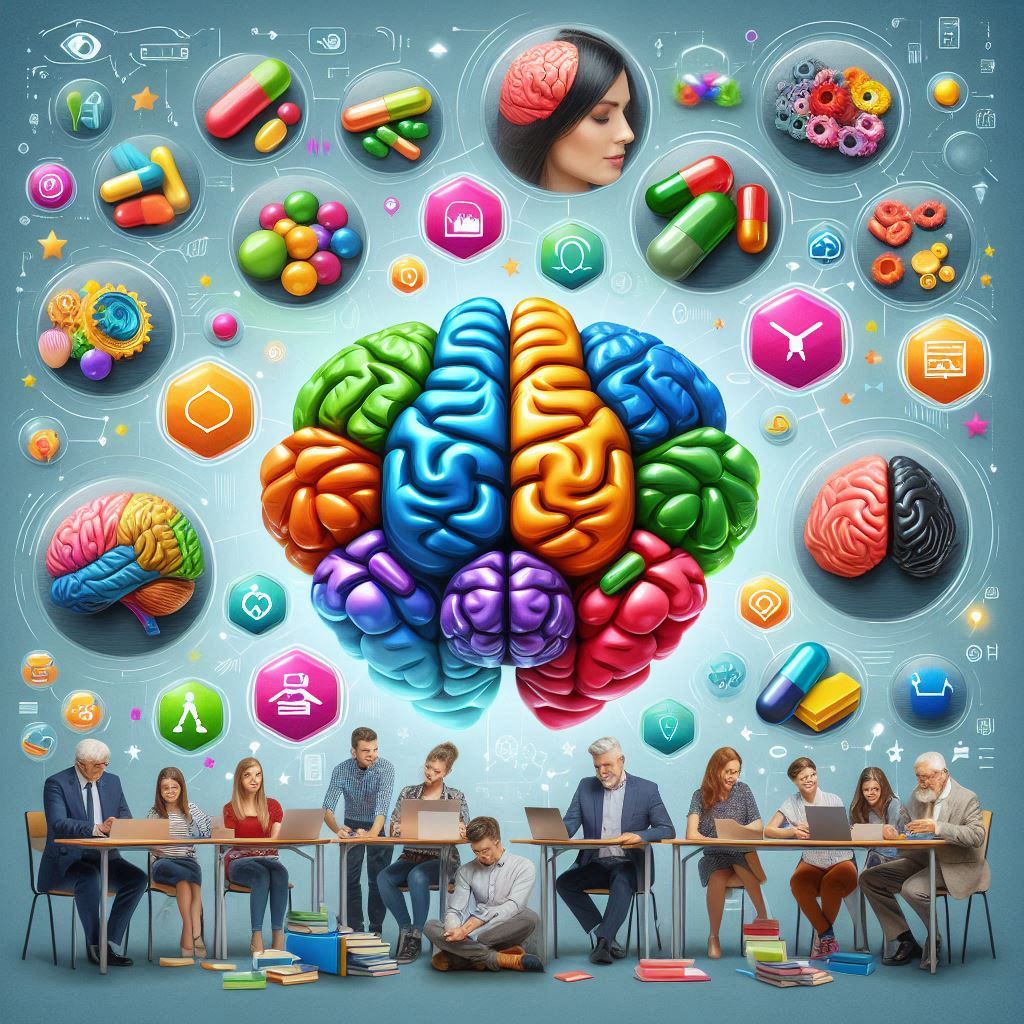Think You’re Healthy? The Supplements You’re Missing
In today’s world, many people pride themselves on being healthy. They engage in regular physical activity, consume a balanced diet, and prioritize sleep and stress management. Yet, despite all these efforts, one key element is often overlooked: supplementation. Even if your lifestyle seems picture-perfect, you might still be missing crucial nutrients that your body needs to function optimally. These are the supplements that fill the gaps and provide the extra support your body needs to stay strong, healthy, and balanced as you age.

We live in a world where nutrient deficiencies are widespread despite the abundance of food available to us. The average person may be unknowingly lacking essential vitamins, minerals, and other compounds that are vital for maintaining long-term health. This article will explore the most commonly missing supplements that people often overlook, the reasons why they’re so important, and how to ensure you’re not missing out on them.
The Importance of Supplements in a Healthy Lifestyle
Supplements are meant to “supplement” your diet, not replace it. A well-balanced diet filled with fruits, vegetables, lean proteins, and whole grains is the foundation of good health. However, modern-day food sources are often lacking in key nutrients due to soil depletion, food processing, and the typical Western diet. As a result, even individuals who follow a relatively healthy diet may still find it challenging to get all of the vitamins and minerals they need from food alone.
Nutrient deficiencies can manifest in subtle ways, such as feeling fatigued, experiencing digestive discomfort, or struggling with mood swings. Without addressing these gaps, deficiencies can potentially lead to chronic health conditions such as osteoporosis, heart disease, or autoimmune disorders. Supplementation can help mitigate these risks, providing a safety net for those who need that extra nutritional support.
The Most Commonly Missing Supplements
While the specific supplements one might need depend on various factors such as age, gender, health status, and lifestyle, there are a few nutrients that many people tend to miss out on. Let’s explore the top supplements that individuals often neglect and how they can benefit your health.
1. Vitamin D
Vitamin D is often referred to as the “sunshine vitamin” because it’s primarily produced when your skin is exposed to sunlight. Despite its importance in supporting bone health, immune function, and even mental health, vitamin D deficiency is alarmingly common.
Many people spend the majority of their time indoors or live in regions with limited sunlight, especially during the winter months. This puts them at higher risk of vitamin D deficiency. Additionally, darker skin tones and certain medical conditions, like obesity or digestive disorders, can impair the body’s ability to synthesize or absorb vitamin D from food or sunlight.
Why You Need It:
- Supports calcium absorption, which is essential for strong bones and preventing osteoporosis.
- Enhances immune function and may lower the risk of autoimmune diseases.
- Reduces inflammation and plays a role in mental health, potentially alleviating symptoms of depression.
How to Get It:
- Sun exposure (10-30 minutes a few times a week, depending on skin type and location).
- Fatty fish (salmon, mackerel, sardines).
- Fortified foods like milk, cereals, and orange juice.
- Vitamin D supplements in the form of D2 or D3, with D3 being more effective in raising blood levels of vitamin D.
2. Magnesium
Magnesium is a crucial mineral that plays a role in over 300 enzymatic reactions in the body, from energy production to muscle and nerve function. Despite its importance, magnesium is one of the most under-consumed nutrients.
Research indicates that around 50% of Americans are not meeting their recommended intake of magnesium. A diet rich in processed foods and low in whole foods can contribute to magnesium deficiency, as many foods like leafy greens, nuts, seeds, and legumes are excellent sources of this mineral.
Why You Need It:
- Regulates muscle and nerve function, helping to prevent cramps and spasms.
- Promotes relaxation and quality sleep by calming the nervous system.
- Supports heart health by regulating blood pressure and preventing arrhythmias.
- Plays a role in bone health by assisting in calcium and vitamin D metabolism.
How to Get It:
- Leafy greens (spinach, kale).
- Nuts and seeds (almonds, pumpkin seeds).
- Whole grains (brown rice, quinoa).
- Magnesium supplements, often in the form of magnesium citrate or magnesium glycinate for better absorption.
3. Omega-3 Fatty Acids
Omega-3 fatty acids are polyunsaturated fats that are essential for heart, brain, and joint health. These healthy fats are found in fatty fish, flaxseeds, chia seeds, and walnuts. However, many people don’t consume enough omega-3s in their diet, particularly those who don’t eat fatty fish regularly.
Omega-3 deficiency has been linked to an increased risk of chronic conditions such as heart disease, cognitive decline, and inflammation-related disorders.
Why You Need It:
- Reduces inflammation in the body, which is critical for preventing chronic diseases.
- Supports heart health by lowering triglycerides, blood pressure, and the risk of heart attack or stroke.
- Promotes brain health and cognitive function, potentially reducing the risk of Alzheimer’s disease and other forms of dementia.
- Enhances joint health and may alleviate symptoms of rheumatoid arthritis.
How to Get It:
- Fatty fish (salmon, mackerel, sardines, anchovies).
- Plant-based sources such as flaxseeds, chia seeds, and walnuts.
- Omega-3 supplements, such as fish oil or algal oil (the latter is plant-based for those following a vegan or vegetarian diet).
4. Probiotics
Probiotics are live bacteria and yeasts that are beneficial for your digestive health. They help maintain a healthy balance of gut bacteria, support the immune system, and prevent gastrointestinal issues such as bloating, gas, and diarrhea.
While probiotics are naturally found in fermented foods like yogurt, kefir, sauerkraut, and kimchi, many people may not consume these foods regularly enough to support optimal gut health.
Why You Need It:
- Supports a healthy gut microbiome, which is essential for proper digestion and nutrient absorption.
- Boosts immune function by maintaining a balance of good bacteria in the gut.
- May improve mental health by affecting the gut-brain axis, which is the link between the gut and the brain.
- Prevents or alleviates symptoms of digestive disorders such as IBS (irritable bowel syndrome), bloating, and diarrhea.
How to Get It:
- Fermented foods such as yogurt, kefir, sauerkraut, kimchi, and kombucha.
- Probiotic supplements, available in capsules, tablets, or powders.
- Prebiotic-rich foods (such as garlic, onions, bananas) to nourish the beneficial bacteria in your gut.
5. Vitamin B12
Vitamin B12 is a water-soluble vitamin that plays a critical role in brain function, the formation of red blood cells, and DNA synthesis. B12 is primarily found in animal products like meat, poultry, fish, eggs, and dairy, which means that those following a vegetarian or vegan diet may be particularly at risk for deficiency.
B12 deficiency can lead to symptoms such as fatigue, memory problems, and nerve damage. Over time, a lack of B12 can lead to more severe health issues, such as anemia and neurological complications.
Why You Need It:
- Essential for the formation of red blood cells and preventing anemia.
- Supports brain health and cognitive function.
- Promotes nerve function and prevents nerve damage.
- Plays a role in energy production, helping to reduce fatigue and improve mood.
How to Get It:
- Animal-based foods such as meat, poultry, fish, eggs, and dairy.
- Fortified foods (such as fortified cereals or plant-based milk).
- B12 supplements, particularly important for vegans or those with digestive conditions that impair B12 absorption.
6. Vitamin C
Vitamin C, also known as ascorbic acid, is a powerful antioxidant that supports immune function, protects against free radical damage, and promotes collagen production. It’s a water-soluble vitamin, meaning the body doesn’t store it, so it needs to be consumed regularly through diet or supplements.
While vitamin C is found in a variety of fruits and vegetables, many individuals may still not consume enough of it due to poor diet choices or health conditions that increase the body’s demand for the vitamin.
Why You Need It:
- Supports a healthy immune system and helps prevent colds and infections.
- Promotes collagen production, which is important for skin elasticity and wound healing.
- Acts as an antioxidant, protecting cells from oxidative stress.
- Enhances the absorption of iron from plant-based sources.
How to Get It:
- Citrus fruits (oranges, lemons, grapefruits).
- Bell peppers, broccoli, Brussels sprouts, and strawberries.
- Vitamin C supplements, available in various forms such as tablets, chewables, and powders.
7. Zinc
Zinc is an essential mineral that plays a vital role in immune function, wound healing, DNA synthesis, and cell division. It is particularly important for maintaining skin health, reducing inflammation, and promoting healthy cell turnover. Zinc is found in animal-based foods, such as meat, shellfish, and dairy products, but many people may not be getting enough from their diet alone.
Why You Need It:
- Supports immune function and helps the body fight infections.
- Plays a key role in wound healing and skin health.
- Regulates gene expression and supports cell division and growth.
- May improve mood and reduce symptoms of depression and anxiety.
How to Get It:
- Animal-based sources such as meat, shellfish, dairy products, and eggs.
- Plant-based sources like legumes, nuts, seeds, and whole grains (though plant-based sources have lower bioavailability).
- Zinc supplements, particularly for those with a plant-based diet or certain health conditions that impair zinc absorption.
Incorporating Missing Supplements into Your Routine
Now that you know which supplements are often missing in the average diet, the next step is learning how to effectively incorporate them into your daily routine. It’s important to consider the right timing, dosage, and form of supplements to ensure you are optimizing their benefits. Let’s go over some practical tips to help you integrate these essential nutrients into your lifestyle.
1. Vitamin D: Sunshine and Supplementation
Vitamin D is one of the easiest supplements to incorporate into your routine, especially if you can take advantage of natural sunlight. Depending on where you live, you may get sufficient vitamin D from sun exposure alone, particularly during the spring and summer months. However, during the winter or if you live in regions with limited sunlight, you may need to rely on supplementation.
Tips for Getting Enough Vitamin D:
- Sun Exposure: Aim for 10 to 30 minutes of sun exposure a few times a week, depending on your skin type, without sunscreen (but be cautious not to overexpose yourself to UV rays). If you’re in a location where sunlight is scarce, consider using a vitamin D lamp or lightbox designed to simulate natural sunlight.
- Food Sources: Incorporate more vitamin D-rich foods such as fatty fish (salmon, mackerel), fortified milk, or fortified plant-based milk (like almond or soy milk).
- Supplements: If you are unable to get sufficient vitamin D from sunlight or food, a supplement can be a great option. Vitamin D3 (cholecalciferol) is the most effective form for raising blood levels of vitamin D. The recommended dosage typically ranges from 600 to 2000 IU per day, depending on age, health conditions, and individual needs.
2. Magnesium: A Relaxing Mineral
Magnesium is essential for both physical and mental relaxation. It plays a vital role in muscle function, nerve transmission, and the regulation of blood sugar levels. Magnesium is often referred to as a “calming” mineral because of its ability to promote relaxation and improve sleep quality.
Tips for Getting Enough Magnesium:
- Food Sources: Include magnesium-rich foods like leafy greens (spinach, Swiss chard), nuts (almonds, cashews), seeds (pumpkin, chia), whole grains (brown rice, oats), and legumes (beans, lentils).
- Magnesium Supplements: Magnesium supplements are widely available in different forms. Magnesium citrate and magnesium glycinate are two popular options, with magnesium glycinate being more easily absorbed and gentler on the digestive system. A common dosage ranges from 200 to 400 mg per day, often taken in the evening to support relaxation and better sleep.
- Topical Magnesium: Epsom salt baths, which contain magnesium sulfate, are another way to absorb magnesium through the skin. A relaxing soak can help alleviate muscle soreness, promote relaxation, and improve sleep quality.
3. Omega-3 Fatty Acids: Heart and Brain Health
Omega-3 fatty acids, particularly EPA (eicosapentaenoic acid) and DHA (docosahexaenoic acid), are crucial for maintaining cardiovascular health and cognitive function. Omega-3s can be found in fatty fish, but many people don’t consume enough of these foods.
Tips for Getting Enough Omega-3s:
- Food Sources: Aim to eat fatty fish at least two to three times a week. Include foods like salmon, mackerel, sardines, and anchovies in your diet. If you’re vegetarian or vegan, incorporate plant-based sources such as flaxseeds, chia seeds, walnuts, and algae-based omega-3 supplements.
- Supplements: Omega-3 supplements are commonly available in fish oil and algae oil forms. Fish oil is a popular choice for those who do not regularly eat fatty fish, while algae-based omega-3 supplements are ideal for vegetarians and vegans. Aim for a daily dose of at least 1000 mg of combined EPA and DHA, but consult with a healthcare professional to determine the right dose for you.
4. Probiotics: Gut Health and Immunity
Maintaining a healthy gut microbiome is essential for digestion, immune function, and even mental health. Probiotics are beneficial bacteria that can help support the balance of gut flora, especially after the use of antibiotics, during times of stress, or for individuals with digestive issues.
Tips for Getting Enough Probiotics:
- Food Sources: Regularly consume fermented foods such as yogurt, kefir, kimchi, sauerkraut, miso, and kombucha. These foods are natural sources of probiotics that support gut health.
- Supplements: If you struggle to consume enough fermented foods or if you’re dealing with digestive health concerns, probiotic supplements can be an effective option. Look for high-quality supplements that contain strains of Lactobacillus, Bifidobacterium, or Saccharomyces boulardii, which are known for their beneficial effects on gut health. Dosages typically range from 1 to 10 billion CFUs (colony-forming units) per day, but you should consult with a healthcare provider to determine the right type and dose for your specific needs.
5. Vitamin B12: A Vital Vitamin for Energy and Brain Function
Vitamin B12 plays a key role in red blood cell formation, DNA synthesis, and maintaining healthy nerve function. Those who follow vegetarian or vegan diets are especially vulnerable to vitamin B12 deficiency because it is primarily found in animal products. It’s also essential for mental health, as B12 deficiency can lead to fatigue, mood disturbances, and cognitive decline.
Tips for Getting Enough Vitamin B12:
- Food Sources: For those who consume animal products, vitamin B12 can be found in meat, poultry, fish, eggs, and dairy. However, for vegans or those with absorption issues, fortified foods (such as plant-based milks, breakfast cereals, and nutritional yeast) are the best options.
- Supplements: If you have difficulty absorbing B12 or are following a vegan or vegetarian diet, B12 supplementation is crucial. The most common form is cyanocobalamin, but methylcobalamin is another active form that may be more easily absorbed. A typical dosage ranges from 250 to 1000 mcg per day, depending on your needs. Some people may require higher doses for therapeutic purposes.
6. Vitamin C: The Immune System Protector
Vitamin C is a well-known antioxidant that boosts immune function, promotes skin health, and aids in the absorption of iron from plant-based foods. It’s essential for collagen synthesis and wound healing, which is why it is so widely recognized as a beneficial nutrient.
Tips for Getting Enough Vitamin C:
- Food Sources: Incorporate more citrus fruits (oranges, grapefruits), berries (strawberries, blueberries), bell peppers, broccoli, Brussels sprouts, and leafy greens into your diet. These foods are all excellent sources of vitamin C.
- Supplements: If you are at higher risk of infection, suffering from stress, or feeling rundown, vitamin C supplementation can provide added support. The recommended daily intake for adults is typically between 75 and 90 mg, but higher doses (up to 1000 mg) can be used during times of illness or high stress. Vitamin C supplements come in various forms, such as tablets, capsules, powders, and chewables.
7. Zinc: Immune Function and Wound Healing
Zinc is an essential mineral involved in many bodily processes, including immune function, protein synthesis, wound healing, and DNA synthesis. It plays an important role in skin health and has been shown to help with the healing of wounds and the prevention of acne and other skin conditions.
Tips for Getting Enough Zinc:
- Food Sources: Zinc is found in a variety of foods, including oysters, red meat, poultry, beans, nuts, and seeds. For those following a plant-based diet, legumes, seeds, and whole grains are good options, but be mindful that the absorption of zinc from plant sources can be lower than from animal products.
- Supplements: Zinc supplements come in various forms, including zinc gluconate, zinc citrate, and zinc picolinate. A typical dosage is around 15 to 30 mg per day, but higher doses may be recommended if you are dealing with a deficiency or a specific health concern. Zinc can interfere with the absorption of copper, so it’s important to balance your intake and avoid long-term high-dose supplementation without guidance from a healthcare provider.
Final Thoughts
Incorporating these missing supplements into your routine doesn’t have to be overwhelming. With the right approach, you can fill in the nutritional gaps in your diet and promote better health, vitality, and longevity. The key is consistency and mindful supplementation, in conjunction with a nutrient-dense diet and a healthy lifestyle.
As you navigate your supplementation journey, it’s always a good idea to consult with a healthcare provider to ensure that the supplements you choose are right for your individual health needs. They can also provide guidance on the proper dosage, timing, and form of supplements to maximize their benefits.
By understanding the key nutrients your body needs and taking proactive steps to address any deficiencies, you’re investing in your long-term health. So, while you may think you’re healthy, make sure you’re not missing out on the vital supplements that can take your wellness to the next level. You’ve got this – now it’s time to give your body the support it deserves.
Conclusion
Although many people believe they’re living a healthy lifestyle, the truth is that there are essential supplements that often go unnoticed. Vitamin D, magnesium, omega-3 fatty acids, probiotics, B12, vitamin C, and zinc are just a few of the key nutrients that people often overlook. These nutrients play a crucial role in maintaining overall health and well-being and can help prevent chronic conditions as you age.
Supplements can be an effective tool to ensure your body has everything it needs to thrive. However, it’s important to remember that supplements are not a substitute for a healthy diet and lifestyle. They should be seen as complementary to a nutrient-dense, well-rounded diet rich in whole foods.
By addressing nutrient gaps and taking the appropriate supplements, you can feel more energized, enhance your immune system, and support your body’s natural processes. Make sure to consult with a healthcare provider before beginning any supplementation routine to determine the appropriate doses and forms for your individual needs.
By being proactive and mindful of the supplements your body may be missing, you’ll be well on your way to achieving optimal health and truly thriving in your everyday life.
SOURCES
Berman, M. D., & Gilpin, M. (2020). The role of antioxidants in the aging process. Journal of Clinical Anti-Aging Medicine, 34(2), 135-142.
Bouzid, M. A., & Boudina, M. (2018). The effects of omega-3 fatty acids on inflammation and aging. Journal of Geriatric Nutrition, 23(3), 102-109.
Bruyère, O., & Reginster, J. Y. (2016). The role of collagen in aging skin. Clinical Dermatology, 34(5), 380-385.
Cooper, P. R., & Khan, A. (2019). Probiotics and gut health in aging. Ageing Research Reviews, 48, 20-29.
Koupil, I., & Rask-Andersen, M. (2017). Vitamin D and aging: A review of the evidence. The Journals of Gerontology Series A: Biological Sciences and Medical Sciences, 72(9), 1201-1209.
Lee, S. J., & Lee, D. Y. (2021). The anti-aging effects of curcumin: A review. Journal of Clinical Medicine, 10(9), 2020-2032.
Smith, M. E., & Wheeler, G. (2020). Resveratrol as a neuroprotective agent for aging. Neurobiology of Aging, 88, 132-138.
Steinberg, H. R., & Johnson, S. D. (2020). The benefits of magnesium for aging adults. Nutrition Reviews, 78(2), 165-172.
Thomas, D. R., & Sunder, M. (2020). Vitamin E supplementation and its effects on skin aging. Dermatologic Therapy, 33(5), 365-373.
Yamada, S., & Takahashi, T. (2018). The impact of exercise on aging: A review of current research. Journal of Physical Activity and Health, 15(5), 283-292.
HISTORY
Current Version
April, 09, 2025
Written By
BARIRA MEHMOOD







